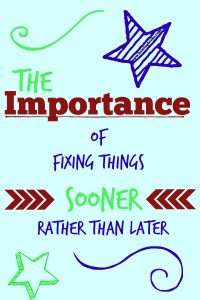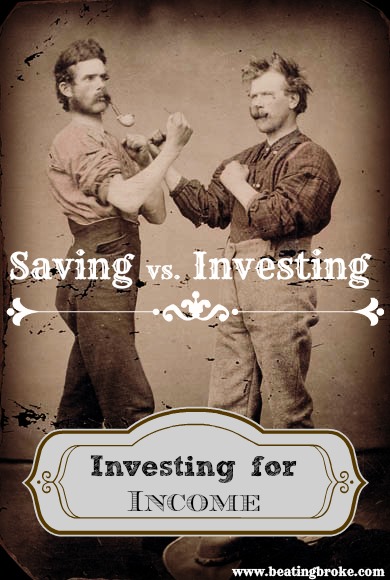A few years ago, my brakes started making noise whenever I pushed the brake pedal. I procrastinated quite a while before I took the car into the shop because I didn’t have the money for the repair. However, because I waited so long, the brakes had worn down to the rotors, so my repair was much more expensive than it would have been had I come in right away.
But Wait! I Hadn’t Learned the Lesson Yet!
You would think I’d have learned my lesson, but no, I haven’t.
We own a minivan that is 11.5 years old and has 167,000 miles on it. A while ago, one of the back sliding door handles broke, so we could no longer use it from the outside. No worries. We simply herded all the kids in through the other side door. Was it a pain? Just a little bit, but we didn’t want to spend $200 to $300 on a door handle repair when we had so many other pressing expenses.
But, then the other sliding door broke. The wire coil started to fray, so we couldn’t open the door. The repair for the outer wire coil? A cool $900 to $1,000. Ouch.

So, we started opening the driver’s side door and reaching around to open the side door with the outside broken handle by using the inside handle. By now, we were starting to feel a bit, um, special, I’ll say, because of our unusual way to open the door. Still, we put off the repair because we had other expenses like a $210 garage door repair and a $90 air conditioning tune up along with a $900 deposit for braces for our son.
All was okay until the inside door handle broke. Now, the only way the kids can get in and out of the car is through the front doors. The special meter has gone up enormously, and even the kids are talking about how embarrassed the are to get in and out of the car. Now that the repair is inevitable, I called the shop to find out the repair will likely be $400 to $500 because they’ll have to remove the door and replace both the inside and outside door handle.
Lesson learned. When a repair is needed, make the repair. If you don’t, you’ll likely end up paying more in the future.
How to Get the Money Together
If your budget is tight like ours is, there are ways to get the money together to make a smaller repair immediately so you don’t have to pay more for a larger repair later:
Raid your emergency fund. This is the easiest. If you have an emergency fund, use the money and then rebuild the emergency fund as quickly as possible.
Have a pantry challenge for a week. We spend approximately $150 to $200 a week for groceries. By taking just one week to eat only what we have in the house and not going to the grocery store, we could have had the money for the handle repair before it got worse. Lesson learned.
Sell stuff. Everyone has stuff around the house that they don’t need or don’t use. Sell things at second hand stores, sports resale stores, or eBay or Facebook. You’ll be surprised how quickly the money will add up.
Do you procrastinate on repairs because your budget is tight? If so, like us, has that rationale ended up costing you more money?
Melissa is a writer and virtual assistant. She earned her Master’s from Southern Illinois University, and her Bachelor’s in English from the University of Michigan. When she’s not working, you can find her homeschooling her kids, reading a good book, or cooking. She resides in New York, where she loves the natural beauty of the area.



